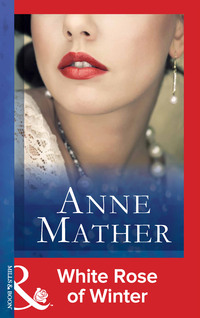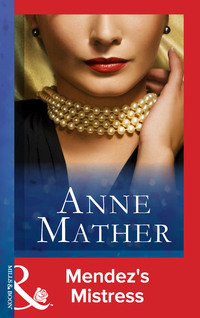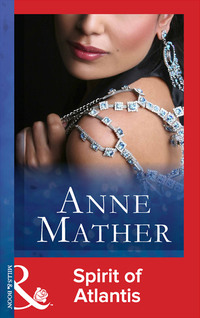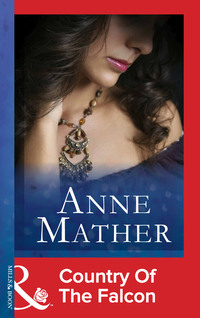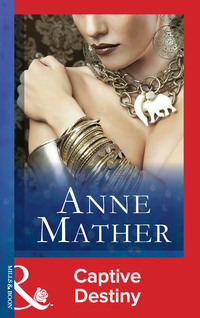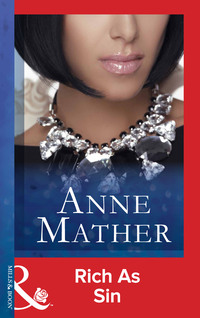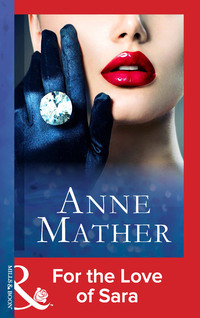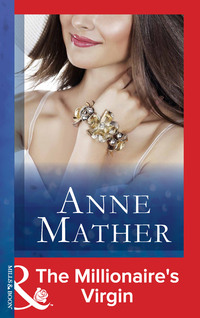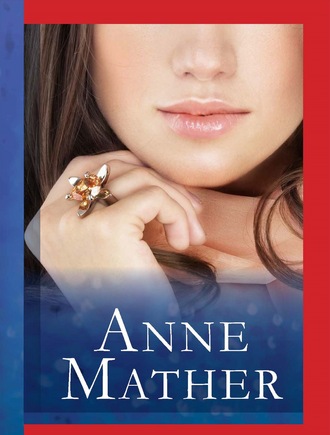
Полная версия
Apollo's Seed

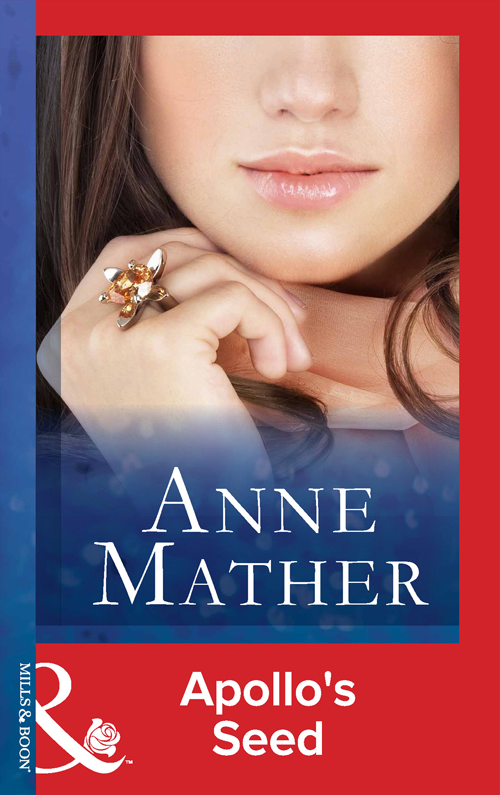
Mills & Boon is proud to present a fabulous
collection of fantastic novels by
bestselling, much loved author
ANNE MATHER
Anne has a stellar record of achievement within the
publishing industry, having written over one hundred
and sixty books, with worldwide sales of more than
forty-eight MILLION copies in multiple languages.
This amazing collection of classic stories offers a chance
for readers to recapture the pleasure Anne’s powerful,
passionate writing has given.
We are sure you will love them all!
I’ve always wanted to write—which is not to say I’ve always wanted to be a professional writer. On the contrary, for years I only wrote for my own pleasure and it wasn’t until my husband suggested sending one of my stories to a publisher that we put several publishers’ names into a hat and pulled one out. The rest, as they say, is history. And now, one hundred and sixty-two books later, I’m literally—excuse the pun— staggered by what’s happened.
I had written all through my infant and junior years and on into my teens, the stories changing from children’s adventures to torrid gypsy passions. My mother used to gather these manuscripts up from time to time, when my bedroom became too untidy, and dispose of them! In those days, I used not to finish any of the stories and Caroline, my first published novel, was the first I’d ever completed. I was newly married then and my daughter was just a baby, and it was quite a job juggling my household chores and scribbling away in exercise books every chance I got. Not very professional, as you can imagine, but that’s the way it was.
These days, I have a bit more time to devote to my work, but that first love of writing has never changed. I can’t imagine not having a current book on the typewriter—yes, it’s my husband who transcribes everything on to the computer. He’s my partner in both life and work and I depend on his good sense more than I care to admit.
We have two grown-up children, a son and a daughter, and two almost grown-up grandchildren, Abi and Ben. My e-mail address is mystic-am@msn.com and I’d be happy to hear from any of my wonderful readers.
Apollo’s Seed
Anne Mather

www.millsandboon.co.uk
MILLS & BOON
Before you start reading, why not sign up?
Thank you for downloading this Mills & Boon book. If you want to hear about exclusive discounts, special offers and competitions, sign up to our email newsletter today!
SIGN ME UP!
Or simply visit
signup.millsandboon.co.uk
Mills & Boon emails are completely free to receive and you can unsubscribe at any time via the link in any email we send you.
Table of Contents
Cover
About the Author
Title Page
CHAPTER ONE
CHAPTER TWO
CHAPTER THREE
CHAPTER FOUR
CHAPTER FIVE
CHAPTER SIX
CHAPTER SEVEN
CHAPTER EIGHT
CHAPTER NINE
CHAPTER TEN
Copyright
CHAPTER ONE
IT was the air she had forgotten, its softness and clarity, the translucent light that made the colours more vivid, and the contrasts more pronounced. Then there was the smell—a distinctive aroma of lemon groves and pomegranate trees, and vines, luscious with ripening fruit. There was nowhere quite like it, and although her love for the islands had been tempered by other emotions, Martha still found it impossible not to respond to their seductive appeal.
She had awakened very early that morning, a not unusual circumstance considering she had gone to bed before ten, she had told herself, ignoring completely the fact that she had not slept well. Not even the two glasses of ouzo she had swallowed, in an attempt to get a good night’s rest, had succeeded in ridding her mind of the problems she faced in the morning, and the night had been spent in uneasy remembrance of a life she had left more than five years ago.
But it was morning now, and from the balcony of her hotel she had a magnificent view of the blue-green waters of the Aegean, with the shadowy coastline of Turkey only a dozen or more miles away. A haze hung on the horizon, a promise of heat to come, but already the air was pleasantly warm and audible with the persistent hum of the cicadas.
She had chosen this hotel because it was near enough to the small town of Rhodes to permit her to ride there in a taxi in less than ten minutes, and not as far along the coast road as the hotel where she and Sarah had stayed almost eight years ago. It would have been too painful, she acknowledged, to stay at the same hotel—primarily, she added bitterly, because it reminded her so strongly of the youth she had wasted.
The swimming pool in the grounds of the hotel below her was already attracting several of the guests, and watching a pallid-skinned teenager do an energetic crawl across its depth, she glanced down at her own pale arms and legs, visible below the candy-stripe of her nightshirt. Wintering in northern climes was certainly a drain on any tan she had had left from the previous year’s trip to the Scilly Isles, and she envied those dark-skinned people who never looked pale and anaemic. Like Dion, she thought, and then grimaced when she realised his name had come automatically to mind. But, considering why she was here, that was not so surprising, she told herself severely, as she left the balcony to bathe and dress.
Nevertheless, having breakfast in the hotel dining room, she felt rather less sure of herself. It wasn’t the first time she had wished she had not allowed herself to be persuaded to come here, and she doubted it would be the last. She wanted to help Roger, of course she did, but this particular demand was surely too much to expect. There must be some other way he could tackle it. And yet wasn’t that exactly why she was here? Because there was no other way? Because the Myconos family had already blocked every other overture he had made?
She sighed, spreading the contents of a tiny tin of apricot conserve across a rather rubbery roll. If only it had been anywhere else than Mycos. Almost any other island! But Roger’s research had led him to believe that Mycos might have given refuge to the Minoans, fleeing the tidal wave that devastated Crete when the volcanic island of Santorini erupted almost three thousand years ago. And although Martha had not wanted to get involved, his persistent assertion that the reason she wouldn’t help him was because she was afraid to contact Dion again had gradually eroded her opposition.
Aware of the dark eyes of a waiter resting upon her, she felt an unwelcome shiver of apprehension slide down her spine. Greek men could be so contemptuous of Western European women. Their eyes admired their slender long-legged beauty, they showered extravagant compliments upon them—but secretly they despised their freedom and independence, even while they were taking advantage of it. Their own women were treated much differently. A Greek girl was still a virgin when she got married, and although her position was in no way equal to that of her husband, she was given his loyalty and fidelity, and the respect due to the mother of his children.
Martha pushed her plate aside half impatiently, and reached for the coffee pot. What was she doing? she asked herself, thinking about such things. They were not her concern—not any longer, at any rate. She had had enough of that kind of confinement, the cloistered life that left a man free to do as he wished, and a woman to do as she was told. If so total a commitment was respect, she could do without it. It was sad for Josy, of course it was, but at least she would have the freedom to do as she liked, and not as her father willed.
The guilt that invariably accompanied this silent defiance spilled over her once again. In all these years, she had not learned the art of self-deception. No matter what she said, no matter how she defended herself, she could never entirely destroy the feeling that she had deliberately deprived the child of her birthright. It was easy enough to state the facts—that Dion hadn’t wanted to listen to her, that he had jumped to reckless conclusions without any proof, that he had driven her away by his absurd jealousy—but there was no denying that she had not denied his belief, had actually enjoyed his almost homicidal fury, and felt a certain smug satisfaction in thwarting him at last.
Those feelings had not lasted long. Indeed, she knew that had he come looking for her in those early days, she would have capitulated and told him the truth. She had loved him, after all, in spite of his faults, and it was not her nature to inflict pain. But he had not, and her hopes had turned to anger, and her anger to resentment, and resentment into bitterness. By the time she did receive a communication from him, Sarah had had her accident, and it was too late then to listen to reason. She had wanted nothing from him. His willingness to condemn her was unforgivable, and later, as her daughter developed into an adorable little girl, she had realised that if Dion ever learned that Josy was his, he might well take her from them, as well as everything else …
Leaving the table, she crossed the tiled floor to the arched exit which gave access to the verandah. It was too early yet to take the taxi into town, and she had no desire to stand about for hours, waiting for Aristotle Myconos.
‘Kalimera, thespinis!’
The waiter who had been observing her earlier had stepped into her path, and was looking down at her with evident admiration. He was a handsome young man, she had to admit, short and stocky like some Greeks, with bulging biceps visible through the sleeves of his thin cotton shirt. He was obviously well used to having success with the unmarried girls who stayed at the hotel, and the arrogance in his face reminded her painfully of that other occasion when she and her sister had accepted a similar invitation.
‘Kalimera,’ she said now, shortly, the tightness of her lips betraying her anger to more discerning eyes. ‘Me sinhorite …,
‘Ah!’ The man’s eyes widened at her casual use of his language. ‘You are Greek?’
‘No. I’m English,’ retorted Martha coldly. ‘Now—if you’ll please get out of my way …’
‘Poli kala …’
The Greek spread his hands expressively, and aware that they had attracted the attention of some of the other waiters, who were watching with amused eyes, Martha walked out of the dining room with burning cheeks.
On the verandah, however, her sense of humour asserted itself. It was ridiculous to get so worked up just because a young man had made a pass at her. What did it matter if he was Greek? It should be good to know that she was still attractive enough to warrant that kind of treatment on her first morning at the hotel, and she had no reason to feel oppressed by it. All the same, it had come too close on the heels of the thoughts that had plagued her during breakfast, and she walked uneasily along the balcony, aware of an increasing state of restiveness. She would be glad when it was ten o’clock, and she could get this interview with Dion’s father over. It was a nerve-racking prospect, and not one she relished, and the determination she had felt in England to show Roger she had no qualms about meeting any of the Myconos family was rapidly waning. Not because she was afraid, she quickly told herself, but simply because she resented having to ask them for anything.
On impulse, she decided to go into town after all. She could always wander round the shops for a while, she thought reasonably. She needed some sun-tan oil. Her skin would quickly blister if she did not take the proper precautions, and that kind of discomfort she could do without.
She went back to her room first to check that her plain denim skirt and blue cotton shirt were suitable, and viewing her reflection in the mirror above the vanity unit, she wondered if her erstwhile father-in-law would notice the shadows beneath her eyes. The light make-up she wore did little to disguise the hollows where dark lashes swept the pale transparency of her cheeks, and she wished for once that she was not so slim. But the care of a five-year-old, an invalid, and a full-time job, was not designed to put flesh on her bones, and since her break-up with Dion, she had had little time to worry about her appearance. Only the heavy silken swathe of honey-coloured hair remained the same, a concession to vanity, and, confined in its single thick braid, an easy extravagance. There was seldom enough money for the luxury of a hairdresser, and Martha had grown used to washing her own hair and letting it dry naturally. Josy’s hair, which Dion had found so unacceptable, was now almost as dark as his, although she had to admit that in other ways, her daughter was much more like herself.
Riding along the coast road in the taxi, Martha was glad her hair was confined. With all the windows open, the stiff breeze would quickly have disordered any hairstyle, but the few strands that blew across her pale forehead only added to her appearance, gentling the somewhat anxious severity of her expression.
‘Mandraki?’ enquired the driver over his shoulder, and Martha gathered her thoughts and nodded.
‘Efharisto,’ she agreed with a small smile, and the driver’s brows lifted in silent approval. The smile erased the shadows from the wide grey eyes and brought an unconscious allure to features that in repose lacked that revealing candour.
Rhodes, or Rodos as the locals called it, was full of tourists. It was the start of the busiest season of the year, and the narrow streets were thronged with people. Open-air bars and tavernas were doing good business, and down by the harbour, there were the usual groups of older Greeks, gathered about the tables on the square, drinking the thick sweet Greek coffee, and arguing the politics of the day.
Martha tipped the driver and left the cab, walking across the road to where a handful of caiques were waiting to transport tourists to the tiny island of Khalki, or to Lindos, on the eastern coast of Rhodes, where the Acropolis attracted more and more visitors every year. She remembered visiting Lindos, and how she and Sarah had fallen about with laughter after jogging halfway up the hillside on donkeys.
Beyond the moorings, the harbour opened out to where the iron deer, Rhodes’ emblem, were perched on top of the harbour pillars. The mighty Colossus of Rhodes was supposed to have bestridden the entry years ago, one of the seven wonders of the ancient world, and without anything to remind one of the twentieth century, it was incredibly easy to imagine oneself back in another older time. Only a car ferry, steaming imperturbably across the horizon, destroyed the illusion, and Martha walked on to where the sea wall provided a buttress against the breeze.
It was nearing ten when she strolled back again, trying to ignore the butterflies in her stomach. She had occupied the last half hour by thinking of Josy, wondering what she was doing at playschool, and whether Sarah was coping in her absence. But now she was forced to think of her reasons for being here, and even to her ears they sounded suspect. It was going to be difficult to explain her gratitude to Roger, without Dion’s father imagining their relationship to be something it was not. How could she expect him to understand that without Roger’s friendship, she and her sister would never have been able to afford the apartment they lived in? That Sarah depended upon him? She could not tell him about Sarah’s accident; that was something too painful to contemplate. And besides, she shrank from any suggestion of appealing for sympathy. Dion must not think she wanted any charity from him or his family. All she hoped for was that Roger should be given the chance to excavate at Simos.
She had written to Aristotle Myconos deliberately. After all, the island belonged to Dion’s father, it was the family estate, and the reason why Roger, and all other archaeologists, were refused permission to work there. Not that either Aristotle, or the members of his family, spent much of their time on Mycos. His shipping concerns meant he, and his three eldest sons, travelled the world quite extensively, and when he was not visiting the Myconos offices in New York or London or Tokyo, he was living in Athens, at his villa, which had a magnificent view of the Acropolis, within easy reach of his headquarters there.
The extent and complexity of the Myconos’ wealth had always been a source of amazement to Martha. She liked money, of course she did, she liked spending it, but the extent to which money played a part in their lives had constantly bewildered her. Her needs had not been extravagant. Food to eat, clothes to wear, a car to drive—and even that had been a luxury, and not essential. It had always amused Dion that she had asked for so little, that she had been embarrassed when he offered her a trousseau from Balmain, or a necklace valued at several thousand pounds, from Tiffanys in New York. He had found it difficult to understand her apparent lack of ambition, the pride which forbade his desire to display her as his possession, and the lingering independence, which had ultimately led to their separation.
It was just as well, she acknowledged now, that she had not adapted too readily to that rarified atmosphere, that sybaritic way of life. It would have been far harder for someone without her streak of stubbornness, someone who had married for money, and not for love. Dion had never really believed that, she had realised long ago. He must always have suspected her feelings for him, been suspicious of her eagerness to become his wife. Deep inside, he had fostered jealousy and uncertainty, and she had finally come to the conclusion that he had confused love with a selfish desire for possession. His feelings had erupted on the night Josy was born, sweet innocent Josy, with that cap of russet-red hair, that had crystallised all Dion’s suspicions into a hard core of distrust.
Aristotle Myconos’s response to her letter had been brief. He refused, he said, to discuss any matter with her in a letter. If she wished to speak to him, she should come out to the islands, and much against her better judgment she had been forced to agree. Besides, she had argued, what could happen to her in Rhodes? She would meet her father-in-law, tell him of Roger’s ambitions and the debt she owed to him, and hope that he would be generous. It was not so much to ask, surely. Roger and his assistant would not bring any disruption to their way of life. And it would be such a coup for the university if he could produce new evidence of what happened to the survivors of that ancient disaster.
The market, across the road from the harbour, was a meeting place for locals and tourists alike. Looking up an alleyway, Martha could see stalls, weighted down with oranges and peaches, and the enormous red and yellow melons, that were so much juicier than the fruit they bought back home. There were toy stalls and clothes stalls, stalls selling leather goods and pottery, and the exquisitely ornamented dolls in traditional costume. She wondered if she ought to buy one of them for Josy, but she couldn’t decide. Might it promote questions she was still not yet ready to answer? Josy had accepted the fact that she did not have a father without too much curiosity so far, but her daughter was an intelligent child, and Martha was constantly aware that sooner or later some more satisfactory explanation would be demanded. That was when the strength of her decision would be tested, and she acknowledged that deep inside her she had doubts as to whether she had the right to lie about the child’s parentage. Since her agreement to speak to Aristotle Myconos on Roger’s behalf, she had wondered whether this might be her opportunity to view the situation objectively, but every time she thought of offering Dion the right to share his daughter, a sense of panic gripped her. She loved Josy so much. Surely that was the important thing—not some nameless sum of money that offered security but nothing else! But if she gave Josy into her father’s care, would the child be able to tell the difference?
She glanced at the watch on her wrist. It was after ten, she saw with some misgivings. The butterflies in her stomach responded with an increasing burst of activity, and she glanced about her anxiously, wondering whether she had mistaken the directions she had been given.
‘Martha!’
The accented masculine tones made her heart skip a beat, and as she turned to face the man who had addressed her, her knees felt ridiculously weak. The similarity to Dion’s voice was unmistakable, but to her intense relief the man confronting her was not her husband, but a stockier, younger facsimile.
‘Alex!’ Martha’s voice betrayed her agitation, and she cast a worried look about her. ‘Alex, what are you doing here?’
Dion’s youngest brother surveyed her unsmilingly. He looked much older somehow than when she had last seen him, and although she realised that five years would have wrought some changes, Alex’s transformation from an easygoing teenager into this serious-looking young man was quite startling. Gone were the jeans and sweat shirt, and in their place was an immaculate cream lounge-suit, and a matching silk shirt and tie. In her simple skirt and cotton shirt, Martha felt absurdly youthful, and she wished she had worn something more formal.
‘Martha,’ he said again, inclining his head, but making no move to kiss her, or shake her hand, or offer her any greeting other than his use of her name. ‘If you will come with me …’
He gestured towards a sleek limousine that was waiting at the kerb a few yards further on, and Martha gave him a curious glance before saying doubtfully:
‘Your father? He’s waiting in the car?’
‘Come.’ Alex spread his hands politely. ‘I will explain.’
Martha hesitated. ‘Your father said he would meet me here,’ she insisted, faint colour invading her cheeks as she realised he was not the ally he had once been. ‘Alex, what’s going on? Where is your father? Can’t you at least tell me that?’
Alex pushed his hands into the pockets of his trousers, and rocked back and forth on his heels and toes. Then, with a sigh, he said: ‘My father is not here, Martha. I am to take you to him. That is all. Now, will you come?’
Martha still resisted. ‘Where is he?’
‘Mycos. Where else?’
‘Mycos!’ Martha gasped. ‘Oh, Alex, I can’t come to Mycos!’
‘You do not wish to see him?’
‘Of course I do.’ Martha’s tongue appeared to moisten her lower lip. ‘Alex, I arranged to meet your father in Rhodes. Not Mycos. I—well, visiting the island was not what we agreed.’
Alex shrugged, the dark brows drawn together over darker eyes. ‘So you are refusing to come?’
‘Alex, Mycos is at least five hours from here!’
‘Not by air.’
‘You have a plane?’ she exclaimed, aghast.
‘A helicopter,’ he amended evenly. ‘Endaksi?’
‘No! That is …’ Martha put an uncertain hand to her forehead, ‘I would rather not meet your father at the villa.’
There was silence for a few moments after she had made this statement, a silence during which she became aware of the people going on with their lives around her, unaware of the intense upheaval she was suffering.


